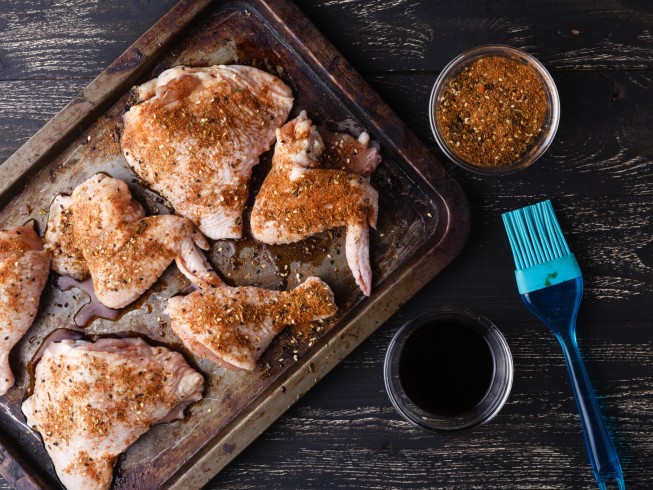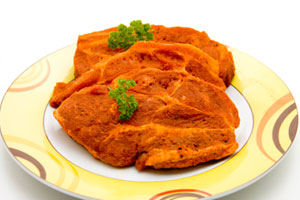Got leftovers? We've got recipes. 18 delicious recipes using cooked chicken (plus 9 bonus recipes!)

Think of this Magic Chicken Rub as your all-access pass to the headliner of tonight's dinner. Just mix, save, and let the flavor take center stage.

1 1/2 teaspoon salt
1/2 teaspoon paprika
1/4 teaspoon cayenne pepper
1/4 teaspoon onion powder
1/4 teaspoon garlic powder
1/4 teaspoon ground black pepper
1/4 teaspoon dried thyme
1/4 teaspoon dried oregano
1/4 teaspoon rubbed sage
1 dash ground cumin
Combine all the ingredients in a bowl and mix well. Store in an airtight container at room temperature for up to 3 months.
Use as desired on poultry as a rub or seasoning, before or after grilling or cooking. Also good on pork, seafood, beef, and vegetables.
Use a mortar and pestle to grind any dried herbs if you prefer a finer texture.
Experiment with adding other spices, like smoked paprika or brown sugar for sweetness.
Always taste your rub before using it, and adjust ingredients to taste.
Use the rub on meats the day before grilling for deeper flavor penetration.
Store the rub in a cool, dry place to maintain its potency for longer.
If you want to make a "wet rub," mix the spice blend with olive oil or yogurt for a richer coating.
Use the rub on roasted nuts for a delicious snack or appetizer.
You can apply the rub to poultry before cooking to add flavor. Massage the rub onto the meat for an even coating, and let it marinate for at least 30 minutes or up to several hours for best flavor.
Store the rub in an airtight container at room temperature, away from direct sunlight, for up to 3 months.
You can substitute similar spices or omit what you don't have. For example, use chili powder in place of cayenne pepper or Italian seasoning in place of thyme, oregano, and sage for a slightly different flavor.
No, it works well on a variety of proteins including pork, beef, and seafood, as well as vegetables. It adds flavor without overpowering the natural taste of the ingredients.
You can easily double or triple the recipe. Just make sure you have a container large enough to hold the increased quantity.
Dried herbs are more concentrated and work well because they evenly distribute throughout the rub. Also, if you are going to store the rub for future use, dried herbs are necessary. However, if you prefer fresh, use about three times the amount of fresh herbs as the dried and use the rub immediately (and discard any leftover rub mix).
To make it milder, reduce or omit the cayenne pepper. To make it spicier, increase the amount of cayenne or add additional hot spices like crushed red pepper flakes.
Yes, sprinkle it on vegetables before roasting or grilling for extra flavor.
Yes, combine the rub with oil and vinegar or citrus juice to create a marinade that boosts the flavor of the meat while tenderizing it.
While it is not common to freeze spice blends, you can. However, freezing may affect the flavor over time. It's best to make smaller batches as needed.
Kosher salt is a good choice because it has a mild flavor and dissolves easily. If using table salt, reduce the amount slightly, as it's more concentrated.
Mixing Bowl: To combine all the spices and seasonings thoroughly.
Measuring Spoons: For measuring the small quantities of spices such as salt, paprika, cayenne pepper, onion powder, garlic powder, black pepper, thyme, oregano, sage, and ground cumin.
Airtight Container: For storing the rub. An airtight container will help preserve the freshness and potency of the spices when kept at room temperature.
Spoon or Whisk: For mixing the ingredients in the bowl.
Storage Labels (optional): For labeling the airtight container, which can help you track the date of preparation and contents.
Grilled Chicken: Use the rub generously on chicken before grilling. The spice blend will create a flavorful crust.
Roasted Vegetables: Sprinkle the rub on mixed vegetables like bell peppers, zucchini, and carrots before roasting. It adds a savory flavor that complements their natural sweetness.
Pork Chops: Apply the rub to pork chops before searing or grilling.
Seafood Skewers: Use the rub on shrimp or fish before skewering and grilling.
Chili: Mix the rub into your chili base for an additional layer of flavor. The spices will meld well with the beans and meat.
Homemade Barbecue Sauce: Mix the rub into a barbecue sauce recipe for enhanced flavor. The spices will carry through to the sauce, adding even more flavor to grilled meats.
Vegetarian Tacos: Use the rub on roasted or sauteed mushrooms and beans as taco filling.
Marinated Olives: Toss olives in olive oil and the rub for an easy appetizer. The spices will add a Mediterranean flavor.
Dipping Sauce: Create a yogurt-based dipping sauce by mixing Greek yogurt with the rub. The creaminess of the yogurt will balance the spices, perfect for grilled meats or veggies.
Egg Salad: Stir a little of the rub into an egg salad for a flavor boost.
Potato Wedges: Season potato wedges with the rub before baking..
Savory Muffins: Incorporate the rub into a savory muffin batter. The spices will liven up the muffins, providing a great snack or breakfast option.
Couscous Salad: Toss cooked couscous with the rub and add fresh herbs and vegetables.
Got leftovers? We've got recipes. 18 delicious recipes using cooked chicken (plus 9 bonus recipes!)
Make your mornings a little less hectic with these overnight breakfast recipes. Prep the night before and enjoy a warm, comforting meal in the morning.
Ranking #1 in nearly every "favorite cookie" poll, the chocolate chip cookie is pretty much the go-to cookie of choice for both kids and grownups alike.

Online since 1995, CDKitchen has grown into a large collection of delicious recipes created by home cooks and professional chefs from around the world. We are all about tasty treats, good eats, and fun food. Join our community of 200K+ members - browse for a recipe, submit your own, add a review, or upload a recipe photo.

reviews & comments